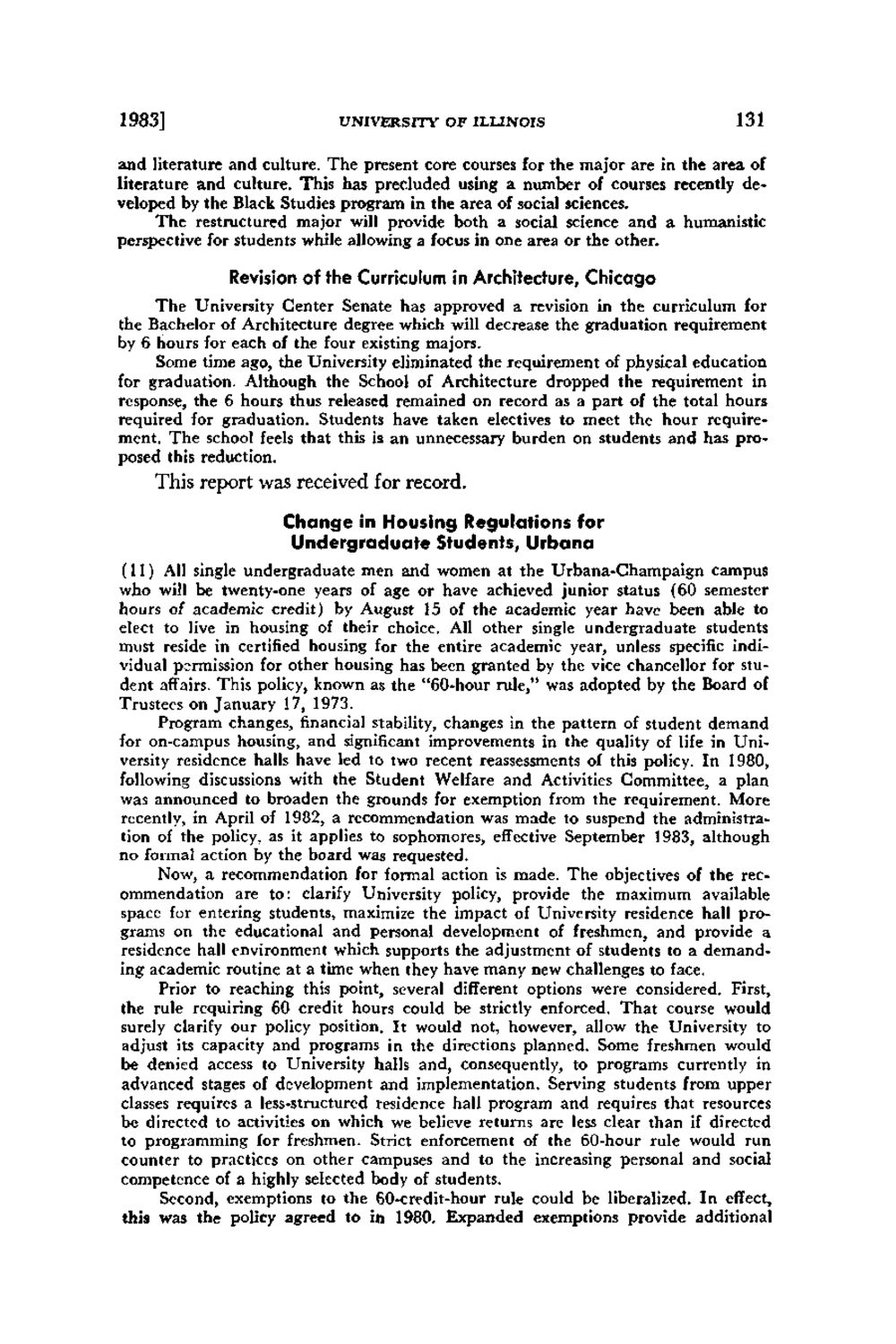| |
| |
Caption: Board of Trustees Minutes - 1984
This is a reduced-resolution page image for fast online browsing.

EXTRACTED TEXT FROM PAGE:
1983] UNIVERSITY OF ILLINOIS 131 and literature and culture. The present core courses for the major are in the area of literature and culture. This has precluded using a number of courses recently developed by the Black Studies program in the area of social sciences. T h e restructured major will provide both a social science and a humanistic perspective for students while allowing a focus in one area or the other. Revision of the Curriculum in Architecture, Chicago The University Center Senate has approved a revision in the curriculum for the Bachelor of Architecture degree which will decrease the graduation requirement by 6 hours for each of the four existing majors. Some time ago, the University eliminated the requirement of physical education for graduation. Although the School of Architecture dropped the requirement in response, the 6 hours thus released remained on record as a part of the total hours required for graduation. Students have taken electives to meet the hour requirement. T h e school feels that this is an unnecessary burden on students and has proposed this reduction. This report was received for record. Change in Housing Regulations for Undergraduate Students, Urbana (11) All single undergraduate men and women at the Urbana-Champaign campus who will be twenty-one years of age or have achieved junior status (60 semester hours ol academic credit) by August 15 of the academic year have been able to elect to live in housing of their choice. All other single undergraduate students must reside in certified housing for the entire academic year, unless specific individual permission for other housing has been granted by the vice chancellor for student affairs. This policy, known as the "60-hour rule," was adopted by the Board of Trustees on January 17, 1973. Program changes, financial stability, changes in the pattern of student demand for on-campus housing, and significant improvements in the quality of life in University residence halls have led to two recent reassessments of this policy. In 1980, following discussions with the Student Welfare and Activities Committee, a plan was announced to broaden the grounds for exemption from the requirement. More recently, in April of 1902, a recommendation was made to suspend the administration of the policy, as it applies to sophomores, effective September 1983, although no formal action by the board was requested. Now, a recommendation for formal action is made. T h e objectives of the recommendation are t o : clarify University policy, provide the maximum available space for entering students, maximize the impact of University residence hall programs on the educational and personal development of freshmen, and provide a residence hall environment which supports the adjustment of students to a demanding academic routine at a time when they have many new challenges to face. Prior to reaching this point, several different options were considered. First, the rule requiring 60 credit hours could be strictly enforced. That course would surely clarify our policy position. It would not, however, allow the University to adjust its capacity and programs in the directions planned. Some freshmen would be denied access to University halls and, consequently, to programs currently in advanced stages of development and implementation. Serving students from upper classes requires a less-structured residence hall program and requires that resources be directed to activities on which we believe returns are less clear than if directed to programming for freshmen. Strict enforcement of the 60-hour rule would run counter to practices on other campuses and to the increasing personal and social competence of a highly selected body of students. Second, exemptions to the 60-credit-hour rule could be liberalized. In effect, this was the policy agreed to in 1980. Expanded exemptions provide additional
| |